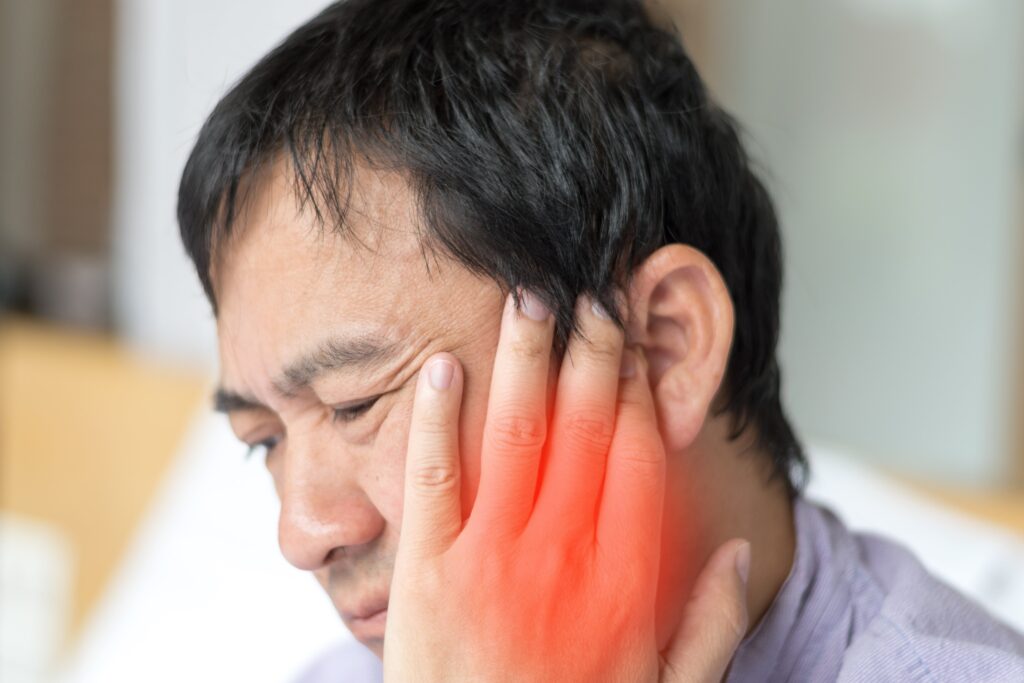
What is TMJ?
The temporomandibular joint (TMJ) is the joint that connects your jaw to the rest of your skull. You can feel this joint on both sides of your face, just in front of your ears. Disorders relating to the TMJ joint are called TMJDs. Common TMJD symptoms include having pain in your jaw or face and having trouble opening your mouth. In this article we’ll discuss TMJDs and how acupuncture can help.
TMJD Symptoms:
You may experience TMJD symptoms on one or both sides of your face. Pain in your jaw or face are typical TMJD symptoms, as well as jaw mobility issues. Other symptoms include:
- Headaches
- Shift in jaw alignment
- Locking of your jaw
- Clicking or popping sounds
- Ringing in your ears
- Vertigo
Causes of TMJD:
The cause of your TMJD can influence your symptoms. Causes of TMJDs range from jaw injuries to growth disorders, bone structure defects from birth, and arthritis. Clenching or grinding your teeth can also cause TMJDs.
TMJD Treatment options:
1. Home Remedies
TMJDs can be treated effectively with home remedies most of the time. Five useful TMJD home remedy tips are:
- Only eat soft foods
- Avoid excessive chewing (eating hard or chewy foods, or chewing gum)
- Apply ice to reduce swelling
- Practise jaw exercises to improve jaw mobility
- Manage stress through meditation techniques
2. Therapy
If home remedies aren’t enough to manage your TMJD symptoms, you could also try therapy. TMJD therapies could involve heat or cooling therapies, exercises, stretches, and stress management therapies.
3. Medications
Medications are also an option for TMJDs. Your doctor may prescribe medications for you if your condition is severe, or if home remedies and therapies are not helping. Before taking any medication, be sure to ask your doctor about potential side effects. Most medications do come with the risk of side effects, which can end up making your health worse.
4. Surgery
Surgery is only rarely recommended to treat TMJD patients. One reason why surgery is used only in rare circumstances is because TMJ surgery can potentially go wrong, which may negatively impact on your health.
How Can Chinese Medicine Help?
If you’re looking for a holistic, natural treatment for TMJD, Chinese Medicine could be right for you! Chinese Medicine has been practised for thousands of years, helping to heal many people from health conditions such as TMJDs. This is done through safe and effective treatments like acupuncture and Chinese herbs.
Since health problems often arise due to underlying imbalances in our organs, an important part of treatment is to rebalance these organ functions. Your Chinese Medicine practitioner can help to strengthen specific organs through Chinese herbs and acupuncture. However, acupuncture can also help to treat TMJD symptoms by improving blood circulation and optimising the flow of energy (Qi) around your body. This can reduce pain and inflammation, which means it’s a great way to naturally manage TMJD symptoms.
Researchers confirm that acupuncture can effectively treat TMJD pain. A recent study found that, “…conventional acupuncture therapy is effective in reducing the degree of pain in patients with TMD, especially those with myofascial pain symptoms.”
Conclusion:
Overall, the TMJ (temporomandibular joint) is the joint that attaches your jaw to your skull. Disorders of the TMJ joint are called TMJ disorders or TMJDs. These disorders usually involve jaw pain, and problems with jaw mobility. Common treatments for TMJDs include home remedies, therapies, and medications, while surgery is a less common option. Alternatively, Chinese Medicine can also treat TMJDs, especially through safe and effective techniques like acupuncture.
References:
Burke, D. (2022, January 14). Temporomandibular Joint (TMJ) Disorders. Healthline. https://www.healthline.com/health/tmj-disorders
Wu, J. Y., Zhang, C., Xu, Y. P., Yu, Y. Y., Peng, L., Leng, W. D., Niu, Y. M., & Deng, M. H. (2017). Acupuncture therapy in the management of the clinical outcomes for temporomandibular disorders: A PRISMA-compliant meta-analysis. Medicine, 96(9), e6064. https://doi.org/10.1097/MD.0000000000006064
